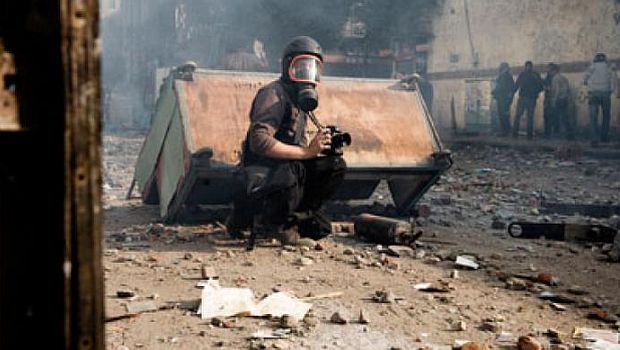
File photo of a front lines journalist whose features are obscured by gas mask while covering the Syrian conflict. (Reuters)
London, Asharq Al-Awsat—The UK-based charity Action on Armed Violence (AOAV) has named eight Arab women among the most influential journalists covering armed violence.
The women recognized were: Zeina Khodr and Hoda Abdel-Hamid at Al Jazeera English, Nima Elbagir at CNN, Hala Jaber at The Sunday Times, Jenan Moussa at Al-Aan TV, Leila Fadel who is the Cairo Bureau Chief of National Public Radio, Rana Jawad, who is famed for her work as the ‘Tripoli witness’ and Al-Arabiya’s Rima Maktabi.
The majority of their work has been focused on the Middle East region, particularly the conflicts and more recent revolutions, and often have demonstrated ground-breaking journalism in their coverage of key events.
The efforts of these women have been globally celebrated alongside leading international journalists such as CNN’s Christiane Amanpour and the BBC’s Jeremy Bowen, who are also recognized on the list.
AOAV highlighted the important role of conflict reporting, saying: “Journalists are the bridge between those peaceful and violent worlds. Without their bravery and determination to bring the realities of armed violence to the rest of the world, we would neither understand nor be able to address the issues that cause and propagate violence.”
In exclusive comments to Asharq Al-Awsat, Lebanese journalist Rima Maktabi said her selection demonstrates the influence that her news channel, Al-Arabiya, enjoys among Arab and international viewers. Maktabi gained international recognition for her coverage of the 2006 war between Israel and Hezbollah.
She emphasized the importance of journalists separating their personal feelings from their professional work, particularly when covering wars and conflict.
She also informed Asharq Al-Awsat that she tries, often unsuccessfully, to protect her family from the dangerous realities of her profession.
“Sometimes I tell them I am in Turkey or Egypt or another other country but they soon discover the truth when I appear on the screen,” she said.
In order to highlight the dangers these journalists face, AOAV said: “We believe that the journalists on this list are exceptional for a number of reasons. Their physical courage—going to war zone after war zone, relaying the ground truth despite the very real risks of injury, imprisonment, torture and death—is commendable on its own merits. No less so is their moral courage: disputing the official narratives of war and armed conflict, challenging the powerful and ruthless.”
The list also included a number of non-Arab journalists whose reporting focus on the Middle East, including Somali radio journalist Mustafa Haji Abdinur, Iraqi journalist Ghaith Abdul-Ahad, NBC News Foreign Correspondent Richard Engel, and British journalist and writer Jason Burke, whose books focus predominantly on Al-Qaeda and 9/11.
